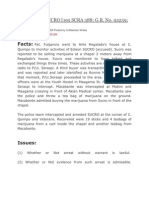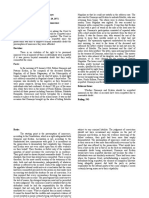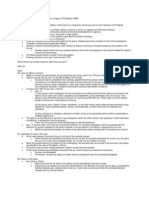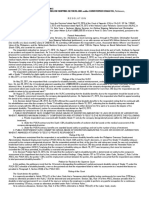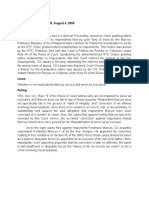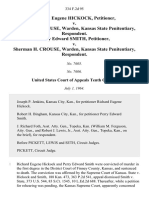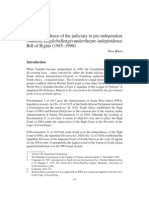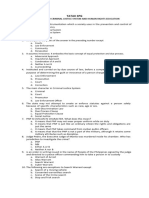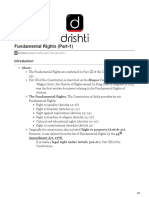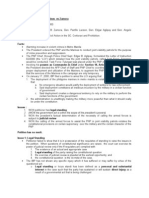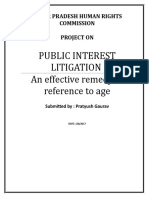Villaflor Vs Summers
Villaflor Vs Summers
Uploaded by
invictusincCopyright:
Available Formats
Villaflor Vs Summers
Villaflor Vs Summers
Uploaded by
invictusincOriginal Description:
Original Title
Copyright
Available Formats
Share this document
Did you find this document useful?
Is this content inappropriate?
Copyright:
Available Formats
Villaflor Vs Summers
Villaflor Vs Summers
Uploaded by
invictusincCopyright:
Available Formats
Villaflor vs Summers [G. R. No. 16444, September 08, 1920] EMETERIA VILLAFLOR, PETITIONER, VS.
RICARDO SUMMERS, SHERIFF OF THE CITY OF MANILA, RESPONDENT. The petitioner prays that a writ of habeas corpus issue to restore her to her liberty. FACTS: In a criminal case pending before the CFI of Manila, EMETERIA VILLAFLOR and FLORENTINO SOUINGCO are charged with the crime of adultery. On this case coming on for trial before the Hon. Pedro Concepcion, Judge of First Instance, upon the petition of the assistant fiscal for the city of Manila, the court ordered the defendant Villaflor, petitioner herein, to submit her body to the examination of one or two competent doctors to determine if she was pregnant or not. The accused refused to obey the order on the ground that such examination of her person was a violation of the constitutional provision relating to selfincrimination. Thereupon she was found in contempt of court and was ordered to be imprisoned in Bilibid Prison until she should permit the medical examination required by the court. The sole legal issue arising from the facts is whether the compelling of a woman to permit her body to be examined by physicians to determine if she is pregnant, violates that portion of the Philippine Bill of Rights and that portion of the Code of Criminal Procedure which find their origin in the Constitution of the United States, providing that no person shall be compelled in any criminal case to be a witness against himself. Counsel for petitioner argues that such bodily exhibition is an infringement of the constitutional provision; the representative of the city fiscal contends that it is not an infringement of the constitutional provision. The trial judge in the instant case has held with the fiscal; while it is brought to our notice that a judge of the same court has held on an identical question as contended for by the attorney for the accused and petitioner. ISSUE: WON compelling a woman to be examined by physicians to determine if she is pregnant violates her right against selfincrimination. RULING: Here before us is presented what would seem to be the most extreme case which could be imagined. While the United States Supreme Court could nonchalantly decree that testimony that an accused person put on a blouse and it fitted him is not a violation of the constitutional provision, while the Supreme Court of Nevada could go so far as to require the defendant to roll up his sleeve in order to disclose tattoo marks, and while the Supreme Court of the Philippine Islands could permit substances taken from the person of an accused to be offered in evidence, none of these even approach in apparent harshness an order to make a woman, possibly innocent, to disclose her body in all of its sanctity to the gaze of strangers. We can only consistently consent to the retention of a principle which would permit of such a result by adhering steadfastly to the proposition that the purpose of the constitutional provision was and is merely to prohibit testimonial compulsion . Here in the Philippines, being in the agreeable state of breaking new ground, we would rather desire our decision to rest on a strong foundation of reason and justice than on a weak one of blind adherence to tradition and precedent. Moreover, we believe that an unbiased consideration of the history of the constitutional provision will disclose that our conclusion is in exact accord with the causes which led to its adoption. Perhaps the best way to test the correctness of our position is to go back once more to elementals and ponder on what is the prime purpose of a criminal trial. As we view it, the object of having criminal laws is to purge the community of persons who violate the laws to the great prejudice of their fellow men. Criminal procedure, the rules of evidence, and constitutional provisions, are then provided not to protect the guilty but to protect the innocent. No rule is intended to be so rigid as to embarrass the administration of justice in its endeavor to ascertain the truth. No accused person should be afraid of the use of any method which will tend to establish the truth. For instance, under the facts before us, to use torture to make the defendant admit her guilt might only result in inducing her to tell a falsehood. But no evidence of physical facts can for any substantial reason be held to be detrimental to the accused except in so far as the truth is to be avoided in order to acquit a guilty person. Obviously a stirring plea can be made showing that under the due process of law clause of the Constitution every person has a natural and inherent right to the possession and control of his own body. It is extremely abhorrent to one's sense of decency and propriety to have to decide that such inviolability of the person, particularly of a woman, can be invaded by exposure to
another's gaze. As Mr. Justice Gray in Union Pacific Railway Co. vs.Botsford said, "To compel any one, and especially a woman, to lay bare the body, or to submit to the touch of a stranger, without lawful authority, is an indignity, an assault, and a trespass." Conceded, and yet, as well suggested by the same court, even superior to the complete immunity of a person to be let alone is the interest which the public has in the orderly administration of justice. Unfortunately, all too frequently the modesty of witnesses is shocked by forcing them to answer, without any mental evasion, questions which are put to them; and such a tendency to degrade the witness in public estimation does not exempt him from the duty of disclosure. Between a sacrifice of the ascertainment of truth to personal considerations, between a disregard of the public welfare for refined notions of delicacy, law and justice cannot hesitate. Fully conscious that we are resolving a most extreme case in a sense, which on first impression is a shock to one's sensibilities, we must nevertheless enforce the constitutional provision in this jurisdiction in accord with the policy and reason thereof, undeterred by merely sentimental influences. Once again we lay down the rule that the constitutional guaranty, that no person shall be compelled in any criminal case to be a witness against himself, is limited to a prohibition against compulsory testimonial self-incrimination. The corollary to the proposition is that, on a proper showing and under an order of the trial court, an ocular inspection of the body of the accused is permissible. The proviso is that torture or force shall be avoided. Whether facts fall within or without the rule with its corollary and proviso must, of course, be decided as cases arise. It is a reasonable presumption that in an examination by reputable and disinterested physicians due care will be taken not to use violence and not to embarrass the patient any more than is absolutely necessary. Indeed, no objection to the physical examination being made by the family doctor of the accused or by doctor of the same sex can be seen. Although the order of the trial judge, acceding to the request of the assistant fiscal for an examination of the person of the defendant by physicians was phrased in absolute terms, it should, nevertheless, be understood as subject to the limitations herein mentioned, and therefore legal. The writ of habeas corpus prayed for is hereby denied. The costs shall be taxed against, the petitioner.
You might also like
- Contents FlammableDocument7 pagesContents FlammableMags Calleja Awang0% (1)
- Government of Hongkong Special Administrative Region vs. Olalia, JR., MBLDocument1 pageGovernment of Hongkong Special Administrative Region vs. Olalia, JR., MBLLaw2019upto2024No ratings yet
- Basco Vs RapataloDocument2 pagesBasco Vs RapataloAliceNo ratings yet
- People vs. PinlacDocument1 pagePeople vs. PinlacDana Denisse RicaplazaNo ratings yet
- Baylon Vs Judge Sison A.M. No. 92-7-360-0 (April 6, 1995)Document3 pagesBaylon Vs Judge Sison A.M. No. 92-7-360-0 (April 6, 1995)elizabethmae100% (2)
- People VS QuitlongDocument1 pagePeople VS QuitlongJenNo ratings yet
- Villaflor V SummersDocument2 pagesVillaflor V SummersAntonio RebosaNo ratings yet
- Conde v. Rivera, G.R. No. 21741Document1 pageConde v. Rivera, G.R. No. 21741Jam Concepcion OdoñoNo ratings yet
- People V Holgado DigestDocument2 pagesPeople V Holgado Digestabo8008No ratings yet
- Gamboa Vs CruzDocument2 pagesGamboa Vs Cruzpaul_jurado18100% (1)
- CASE # 39 US Vs Tan Teng G.R. No. 7081, September 7, 1912 (SEC 17 ART 3 BILL OF RIGHTS) FactsDocument2 pagesCASE # 39 US Vs Tan Teng G.R. No. 7081, September 7, 1912 (SEC 17 ART 3 BILL OF RIGHTS) FactsAerith Alejandre100% (1)
- United States V TantengDocument1 pageUnited States V TantengMichelleGebanaNo ratings yet
- People Vs DramayoDocument1 pagePeople Vs DramayoPaul Joshua Torda SubaNo ratings yet
- Galman Vs SandiganbayanDocument1 pageGalman Vs Sandiganbayanwiggie27No ratings yet
- People Vs ObsaniaDocument2 pagesPeople Vs ObsaniaRicky VillaruzNo ratings yet
- People v. HolgadoDocument1 pagePeople v. HolgadoJames Erwin Velasco100% (1)
- 122-ATIENZA - People vs. Fortes (G.R. No. 90643, June 25, 1993)Document2 pages122-ATIENZA - People vs. Fortes (G.R. No. 90643, June 25, 1993)Adrian Gabriel S. Atienza100% (1)
- 66 Posadas Vs CA PDFDocument2 pages66 Posadas Vs CA PDFKJPL_1987No ratings yet
- 40 BELTRAN v. SAMSONDocument2 pages40 BELTRAN v. SAMSONAerith Alejandre100% (3)
- People vs. TeeDocument2 pagesPeople vs. TeeDana Denisse RicaplazaNo ratings yet
- Pecho vs. PeopleDocument2 pagesPecho vs. PeopleDana Denisse Ricaplaza100% (1)
- 242 U.S. V Tan Teng - DigestDocument1 page242 U.S. V Tan Teng - Digestadee100% (3)
- People vs. Macam DigestedDocument2 pagesPeople vs. Macam DigestedClavel Tuason100% (1)
- People vs. City Court of Silay: CanesDocument7 pagesPeople vs. City Court of Silay: CanesRegine LangrioNo ratings yet
- Silverio Vs CADocument1 pageSilverio Vs CASaji JimenoNo ratings yet
- PEOPLE Vs Sucro Case DigestDocument2 pagesPEOPLE Vs Sucro Case DigestEunice Moral100% (4)
- Case No. 135 - US Vs Ong Siu Hong 36 Phil 735Document1 pageCase No. 135 - US Vs Ong Siu Hong 36 Phil 735raikha barraNo ratings yet
- 230 Serafin Vs LindayagDocument2 pages230 Serafin Vs Lindayagkarl doceoNo ratings yet
- Flores Vs People GR L-25769 December 10 1974Document2 pagesFlores Vs People GR L-25769 December 10 1974Vic Rabaya100% (2)
- HIMAGAN Vs PEOPLEDocument1 pageHIMAGAN Vs PEOPLEabethzkyyyy100% (1)
- People v. Dramayo (A.E. Nuyda)Document2 pagesPeople v. Dramayo (A.E. Nuyda)Earl NuydaNo ratings yet
- Borja v. Mendoza G.R. No. L-45667Document2 pagesBorja v. Mendoza G.R. No. L-45667Jam Concepcion OdoñoNo ratings yet
- Roan v. GonzalesDocument1 pageRoan v. GonzalesRica Marion DayagNo ratings yet
- People Vs Ylagan Rule 117Document2 pagesPeople Vs Ylagan Rule 117Czara Dy100% (1)
- Case Digest People Vs Aminudin - G.R. No. 74869Document1 pageCase Digest People Vs Aminudin - G.R. No. 74869JamesHarvey100% (1)
- People of The Philippines vs. Edison Sucro (G.r. No. 93239 March 18, 1991)Document2 pagesPeople of The Philippines vs. Edison Sucro (G.r. No. 93239 March 18, 1991)Ei BinNo ratings yet
- Tatad vs. SandiganbayanDocument1 pageTatad vs. SandiganbayanDana Denisse RicaplazaNo ratings yet
- People V Agbayani DigestDocument1 pagePeople V Agbayani DigestJay SosaNo ratings yet
- Us V Tan TengDocument6 pagesUs V Tan TengMabelAbadillaNo ratings yet
- Navallo vs. SandiganbayanDocument1 pageNavallo vs. SandiganbayanDana Denisse RicaplazaNo ratings yet
- 8 People vs. BolanosDocument1 page8 People vs. BolanosGuiller C. MagsumbolNo ratings yet
- Aniag Vs Comelec DigestDocument3 pagesAniag Vs Comelec DigestMaica Reyes100% (1)
- Paulin vs. GimenezDocument1 pagePaulin vs. GimenezDana Denisse RicaplazaNo ratings yet
- G.R. No. 97936 May 29, 1995 PEOPLE OF THE PHILIPPINES, Plaintiff-Appellee, vs. Alejandro Lucero Y Nature of The Action: Appeal Facts of The CaseDocument2 pagesG.R. No. 97936 May 29, 1995 PEOPLE OF THE PHILIPPINES, Plaintiff-Appellee, vs. Alejandro Lucero Y Nature of The Action: Appeal Facts of The CaseNivra Lyn EmpialesNo ratings yet
- (People v. Salvatierra) DigestDocument2 pages(People v. Salvatierra) DigestitsmestephNo ratings yet
- People Vs HolgadoDocument2 pagesPeople Vs HolgadoJessamine Orioque100% (2)
- PSB v. Bermoy, GR151912 - DIGESTDocument2 pagesPSB v. Bermoy, GR151912 - DIGESTJoycee Armillo50% (2)
- Beltran v. SamsonDocument1 pageBeltran v. SamsonTrinca Diploma100% (3)
- Petition For Radio and TV Coverage of Multiple Murder Cases Against Maguindanao Zaldy AmpatuanDocument2 pagesPetition For Radio and TV Coverage of Multiple Murder Cases Against Maguindanao Zaldy AmpatuanJosephine BercesNo ratings yet
- 109 Vaporoso V PeopleDocument4 pages109 Vaporoso V Peoplemiyumi100% (1)
- Tampar v. Usman - 200 SCRA 652Document1 pageTampar v. Usman - 200 SCRA 652ashyyNo ratings yet
- Gamboa v. CruzDocument2 pagesGamboa v. Cruzd2015memberNo ratings yet
- People v. EstoistaDocument1 pagePeople v. EstoistamariannecarmNo ratings yet
- Serafin vs. LindayagDocument1 pageSerafin vs. LindayagDana Denisse RicaplazaNo ratings yet
- People v. Obsania Case DigestDocument2 pagesPeople v. Obsania Case DigestJoyie AntenorNo ratings yet
- Talino v. Sandiganbayan, G.R. Nos. L-75511-14, March 16, 1987Document2 pagesTalino v. Sandiganbayan, G.R. Nos. L-75511-14, March 16, 1987Dominique Vasallo100% (1)
- People v. AdilDocument2 pagesPeople v. AdilVian O.No ratings yet
- CD 116. Villaflor v. Summers, 41 Phil. 62 (1920)Document1 pageCD 116. Villaflor v. Summers, 41 Phil. 62 (1920)JMae MagatNo ratings yet
- Villaflor Vs SummersDocument1 pageVillaflor Vs SummersKling KingNo ratings yet
- XVIII. Right To Self-IncriminationDocument14 pagesXVIII. Right To Self-IncriminationJoannah GamboaNo ratings yet
- Villaflor vs. SummersDocument1 pageVillaflor vs. SummersAname BarredoNo ratings yet
- Abs V NazarenoDocument1 pageAbs V NazarenoinvictusincNo ratings yet
- 07 - Sealanes V Dela TorreDocument2 pages07 - Sealanes V Dela TorreinvictusincNo ratings yet
- 14 - San Miguel Vs CADocument3 pages14 - San Miguel Vs CAinvictusincNo ratings yet
- Pigcaulan V SecretaryDocument3 pagesPigcaulan V SecretaryinvictusincNo ratings yet
- M/V Federal Nord Abstract From Deck Log Book Re: Ch/Cook Legahi Cristonico B. 6th JANUARY 1993Document3 pagesM/V Federal Nord Abstract From Deck Log Book Re: Ch/Cook Legahi Cristonico B. 6th JANUARY 1993invictusincNo ratings yet
- 09 Association of International Shipping Lines V United Harbor PilotDocument5 pages09 Association of International Shipping Lines V United Harbor PilotinvictusincNo ratings yet
- 10 - Dacut V CADocument3 pages10 - Dacut V CAinvictusincNo ratings yet
- 01 Luzon Stevedoring Co V Luzon Marine Dept UnionDocument4 pages01 Luzon Stevedoring Co V Luzon Marine Dept UnioninvictusincNo ratings yet
- V. Jelks Et Al - Document No. 3Document10 pagesV. Jelks Et Al - Document No. 3Justia.comNo ratings yet
- S.S. Jain Subodh Law College: Mr. Akshay Jain Semester-7 (B) Roll No. - 57Document23 pagesS.S. Jain Subodh Law College: Mr. Akshay Jain Semester-7 (B) Roll No. - 57Yashvardhan TolaniNo ratings yet
- Republic Vs Marcos GR Nos 130371 & 130855, August 4, 2009 FactsDocument10 pagesRepublic Vs Marcos GR Nos 130371 & 130855, August 4, 2009 FactsJoselle ReyesNo ratings yet
- Richard Eugene Hickock v. Sherman H. Crouse, Warden, Kansas State Penitentiary, Perry Edward Smith v. Sherman H. Crouse, Warden, Kansas State Penitentiary, 334 F.2d 95, 10th Cir. (1964)Document11 pagesRichard Eugene Hickock v. Sherman H. Crouse, Warden, Kansas State Penitentiary, Perry Edward Smith v. Sherman H. Crouse, Warden, Kansas State Penitentiary, 334 F.2d 95, 10th Cir. (1964)Scribd Government DocsNo ratings yet
- Key Concepts and Theories 12th NCERTDocument116 pagesKey Concepts and Theories 12th NCERTSundeep Chopra0% (1)
- Horn - The Independence of The Judiciary in Pre-Independent NamibiaDocument21 pagesHorn - The Independence of The Judiciary in Pre-Independent NamibiaAndré Le RouxNo ratings yet
- Socsci 6 QuestionsDocument4 pagesSocsci 6 QuestionsHyman Jay BlancoNo ratings yet
- DraftingDocument46 pagesDraftingRachna YadavNo ratings yet
- United States of America Ex Rel. John A. Easterling v. Walter H. Wilkins, Warden of Attica State Prison, Attica, New York, 303 F.2d 883, 2d Cir. (1962)Document4 pagesUnited States of America Ex Rel. John A. Easterling v. Walter H. Wilkins, Warden of Attica State Prison, Attica, New York, 303 F.2d 883, 2d Cir. (1962)Scribd Government DocsNo ratings yet
- Enforced Disappearance in Bangladesh PDFDocument5 pagesEnforced Disappearance in Bangladesh PDFMohammad AshrafuzZamanNo ratings yet
- 2 Tiu VS DizonDocument6 pages2 Tiu VS DizonAlex FranciscoNo ratings yet
- MCQ CJS Human Rights Education December 2022Document6 pagesMCQ CJS Human Rights Education December 2022Vj BinagatanNo ratings yet
- Hernandez v. San Juan-Santos (2009)Document13 pagesHernandez v. San Juan-Santos (2009)Gerard Anthony Teves RosalesNo ratings yet
- Fundamental Rights Part 1Document8 pagesFundamental Rights Part 1HarshitaNo ratings yet
- Katarungang PambarangayDocument6 pagesKatarungang PambarangayPrin CessNo ratings yet
- Due Process of LawDocument5 pagesDue Process of LawFreeman LawyerNo ratings yet
- STATCON Chapter 3 Digested CasesDocument31 pagesSTATCON Chapter 3 Digested CasesSM BArNo ratings yet
- Blog Ipleaders in Writ Jurisdiction of Supreme CourtDocument8 pagesBlog Ipleaders in Writ Jurisdiction of Supreme CourtSwapnil wNo ratings yet
- Atty. Uy (DAY 2) Remedial LawDocument42 pagesAtty. Uy (DAY 2) Remedial LawLoveUyNo ratings yet
- Final New CasesDocument128 pagesFinal New CasesGe LatoNo ratings yet
- Midterm Exam in UCSPDocument7 pagesMidterm Exam in UCSPLorebeth MontillaNo ratings yet
- 05 Jurisdiction of The MTCDocument8 pages05 Jurisdiction of The MTCMarichelNo ratings yet
- (HC) Vogelsang v. California Department of Corrections and Rehabilitation Et Al - Document No. 9Document3 pages(HC) Vogelsang v. California Department of Corrections and Rehabilitation Et Al - Document No. 9Justia.comNo ratings yet
- IBP Vs ZamoraDocument4 pagesIBP Vs ZamoraMark Leo BejeminoNo ratings yet
- Public Interest LitigationDocument32 pagesPublic Interest LitigationPratyush GuptaNo ratings yet
- Ampatuan vs. MacaraigDocument2 pagesAmpatuan vs. MacaraigCherrie May OrenseNo ratings yet
- Charles BROWN, Appellant v. Robert SHANNON The District Attorney of The County of Philadelphia The Attorney General of The State of PennsylvaniaDocument10 pagesCharles BROWN, Appellant v. Robert SHANNON The District Attorney of The County of Philadelphia The Attorney General of The State of PennsylvaniaScribd Government DocsNo ratings yet
- Kilgore v. Patrick - Document No. 5Document1 pageKilgore v. Patrick - Document No. 5Justia.comNo ratings yet
- Chavez V. CADocument2 pagesChavez V. CAadeeNo ratings yet

























